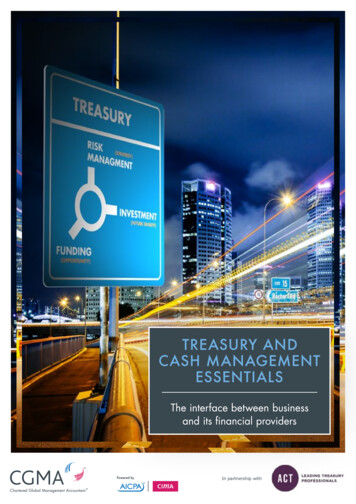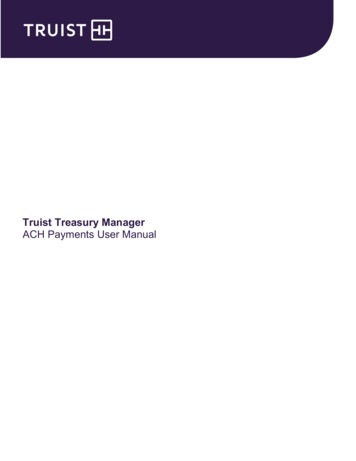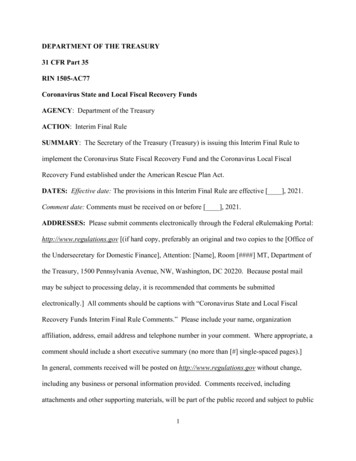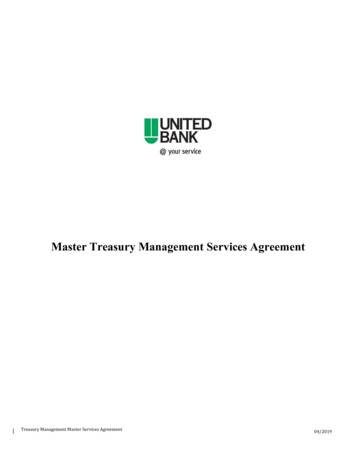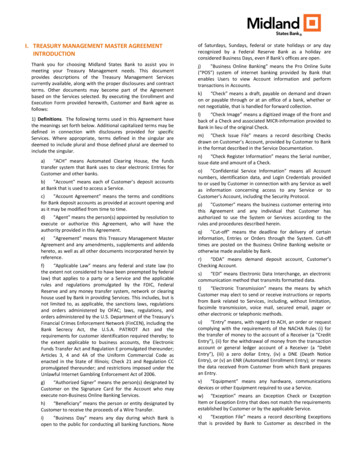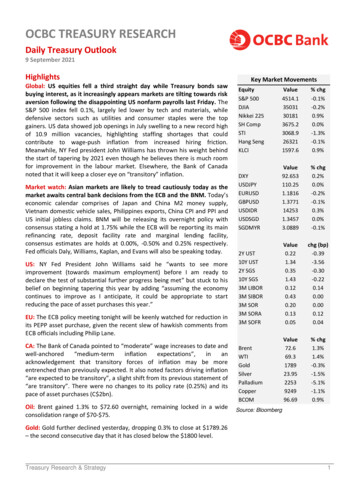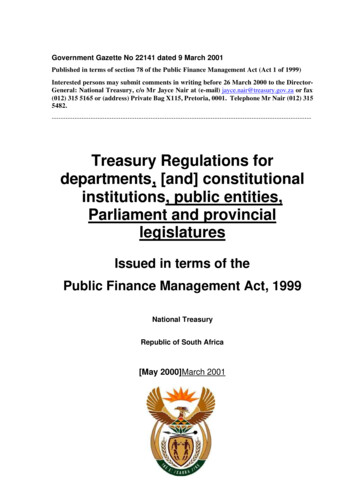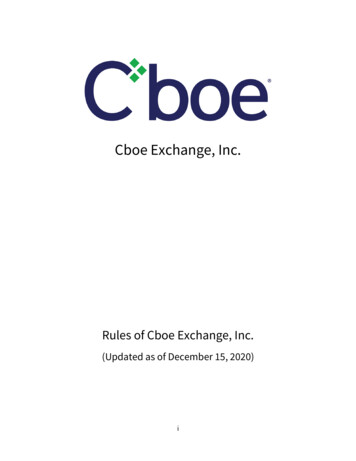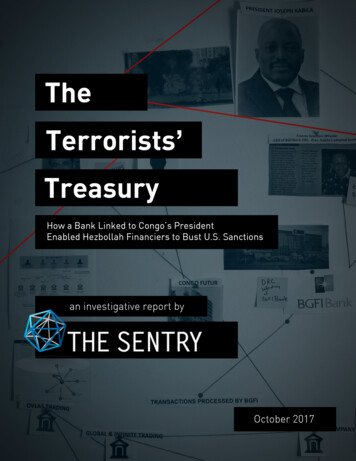
Transcription
The Terrorists’ TreasuryHow A Bank Linked to Congo’s President EnabledHezbollah Financiers to Bust U.S. SanctionsOctober 2017The Sentry is an initiative of the Enough Project and Not On OurWatch (NOOW), with investigative support from the Center forAdvanced Defense Studies (C4ADS).Photo Credit: The Sentry1The Sentry TheSentry.orgThe Terrorists’ Treasury: How a Bank Linked to Congo’s President Enabled Hezbollah Financiers to Bust U.S. SanctionsOctober 2017
Executive SummaryThe same banks used by kleptocratic governments to divert state assets can also be used byterrorist financing networks. This is what has taken place at one prominent bank in the DemocraticRepublic of the Congo (DRC). Individuals and entities subject to U.S. sanctions, in connection withHezbollah, used the bank to move money through the international banking system, despiteseveral warnings from bank employees that doing so could violate U.S. sanctions. This was notjust any bank. BGFIBank DRC, the institution that processed the transactions, is run by PresidentJoseph Kabila’s brother and has been mentioned in a recent scandal in Congo involving thealleged diversion of public funds from state-owned mining companies and the national electoralcommission.1As set out in this report, in 2011 bank employees at BGFIBank DRC raised the alarm with seniorofficials at the bank, in writing, about a series of transactions. The concern was that thetransactions involved companies linked to financiers of Hezbollah, a Lebanon-based terroristgroup and political party. The main entities in question were subsidiaries of Kinshasa-basedbusiness conglomerate Congo Futur, a company under U.S. Department of the Treasurysanctions. Among the recipients of the warnings was Francis Selemani Mtwale, the bank’s CEOand brother of President Joseph Kabila.2 But the bank’s relationship with Hezbollah-linkedcompanies continued. BGFIBank DRC even went so far as to request that certain transactions beunblocked by the U.S. Treasury Department’s Office of Foreign Assets Control (OFAC) after otherbanks refused to process them. And BGFIBank DRC continued to engage in correspondence withCongo Futur-affiliated company representatives in 2016. This raises major questions about thebank’s ability and willingness to fulfill its sanctions and anti-money laundering complianceobligations.BGFIBank DRC has been reported to have been used to divert significant public funds in Congo,including millions of dollars in withdrawals by Congo’s electoral commission, and transfers of 8million in cash in irregular “tax advances” from Congo’s largest state-owned mining company,Gécamines.3 Published reports raise serious questions about the bank’s regulatory andcompliance regime.Inadequate anti-money laundering compliance and sanctions enforcement standards at banks canempower a wide range of criminal groups and corrupt actors—and ultimately underminegovernance and contribute to instability in Congo and elsewhere. Members of civil society havesuggested that business interests could be part of the reason Kabila, who has sparked a violentnationwide political crisis by recently overstaying his presidential term limits, has maintained aniron grip on the presidency.4In the example profiled in this report, BGFIBank DRC’s approach to enforcing sanctions hasallowed Kassim Tajideen—described by the U.S. government as “an important financialcontributor” who “has contributed tens of millions of dollars to Hizballah”5—and his network tomaintain access to the global financial system despite being placed under U.S. sanctions in 2009and 2010. The documents reviewed by The Sentry also show links between Congo Futur andother firms under Kassim Tajideen’s control. These documents indicate that Congo Futursubsidiaries used BGFIBank DRC to operate accounts and make wire transfers after both Congo2The Sentry TheSentry.orgThe Terrorists’ Treasury: How a Bank Linked to Congo’s President Enabled Hezbollah Financiers to Bust U.S. SanctionsOctober 2017
Futur and Kassim were placed under U.S. sanctions, despite warnings from bank employees thatthe bank should not do so. This is despite repeated public assertions from both Kassim and oneof his brothers who is not under U.S. sanctions, Congo Futur General Manager Ahmed Tajideen,that the Kinshasa-based conglomerate had no links to any of the Tajideens under U.S. sanctions.Congo Futur has continued to thrive in Congo despite U.S. sanctions; it even maintains financialties to the Congolese government and has received government contracts. These continuedrelations raise serious questions about the Congolese government’s reliability in the fight againstglobal terrorism, transnational crime, and illicit finance. Congo Futur has risen and remainedprominent despite facing sanctions and the Kabila regime’s decreasing legitimacy. BGFIBankDRC has been used to facilitate Congo Futur’s access to the U.S. financial system, despitesanctions.While this example shows how banks can be exploited by kleptocrats and terrorist financiers alike,the continued reliance on the global financial system by these actors means that the internationalcommunity has the power to address that dual threat. Until law enforcement and policymakersintervene, exploitative corporate actors and political elites will be able to act with impunity. Butthere is a clear way forward. Higher-level network sanctions, criminal investigations andprosecutions, anti-money laundering measures, improved banking due diligence, andtransparency make for a potent combination. Applied deftly by the United States, European Union,and international banking authorities, these measures can sever the financial lifelines by whichcorrupt government officials, terrorist financiers, and their business networks operate. The Sentrymakes the following recommendations:1. Targeted Sanctions. The United States and European Union should urgently impose andimplement three sets of targeted economic sanctions actions: 3The U.S. government should investigate and act pursuant to Executive Order 13224,which is the principal authority used for counterterrorism sanctions, to designate anyofficials at BGFIBank DRC who the United States identifies as having knowinglyundertaken transactions on behalf of Congo Futur, as well as to designate any otherentities in the Congo Futur network that the United States identifies as engaged inunlawful activities.The U.S. government should investigate and act pursuant to Executive Order 13671and the European Union should investigate and act pursuant to Regulation (EC) No.1183 of July 18, 2005 and Regulation (EU) 2016/2230 (2), which are the principal U.S.and EU authorities used for sanctions related to the Democratic Republic of Congo, todesignate the networks of senior members of the regime, including financial advisors,Kabila family members, and their companies that the United States and the EuropeanUnion identify as having engaged in unlawful activities.The U.S. government should sanction those responsible for “acts of significantcorruption” in connection with the transactions described in this report, pursuant to theGlobal Magnitsky Human Rights Accountability Act (Public Law 114-328).6The Sentry TheSentry.orgThe Terrorists’ Treasury: How a Bank Linked to Congo’s President Enabled Hezbollah Financiers to Bust U.S. SanctionsOctober 2017
The impact of these sanctions actions would be the same: to freeze the assets of any designatedindividuals and entities and block them from the financial system.2. Criminal Investigations. The U.S. Department of Justice should expand its investigation intothe Tajideen network to evaluate the potential criminal liability of BGFIBank DRC leadership forknowingly doing business with Hezbollah financiers pursuant to the U.S. Patriot Act and the U.S.International Emergency Economic Powers Act (IEEPA). Specialized human rights andtransnational crimes units in the United States and Europe should investigate whether entitieswithin their jurisdiction have ties to the Tajideen network, with a view toward any financialfacilitation of terrorist activities or human rights violations, including the potential facilitation ofcrimes occurring in Congo.3. Anti-Money Laundering/Counter-Threat Finance Actions. The U.S. Treasury Department’sFinancial Crimes Enforcement Network (FinCEN) and financial intelligence units (FIUs) in Europeshould immediately investigate the transactions described in this report and, if warranted, issueadvisories to banks and other financial institutions. FinCEN should issue an investigative request,pursuant to its authority under Section 314(a) of the Patriot Act, to request that banks search forrecords related to the individuals and companies involved. If FinCEN identifies specific patterns ofmoney laundering or threat finance, the advisories should state the risk that banks conductingbusiness with BGFIBank DRC may incur by processing transactions on behalf of Hezbollah-linkedentities. If warranted, FinCEN should also warn of the broader risks evident in the Congolesebanking system, specifically the money laundering and threat finance risks related to thecorruption of the Kabila regime and business network. This critical step would lead banks toconduct greater vigilance and reporting and could lead to further FIU actions.4. Bank Due Diligence/De-Risking. Global banks with commercial relationships in Congo shouldimmediately undertake enhanced due diligence on those relationships with banks in Congo,including provision of correspondent banking, trade finance, and other services, while at the sametime being cognizant of and avoiding over-compliance and de-risking.5. Public Corporate Registry. The Congolese government, led by the Ministry of the NationalEconomy and the Ministry of Foreign Commerce, should create a searchable online public registryof all corporate entities formed in the country to improve corporate transparency, public oversight,and accountability.4The Sentry TheSentry.orgThe Terrorists’ Treasury: How a Bank Linked to Congo’s President Enabled Hezbollah Financiers to Bust U.S. SanctionsOctober 2017
The WarningIn the heart of the central district of the Democratic Republic of Congo’s capital city of Kinshasa,a tower covered in reflective windows dominates the skyline. This is the listed headquarters ofCongo Futur, a company that has remained one of the major business conglomerates in Congoeven after U.S. sanctions were placed on it. Its operations include mining, real estate, construction,and trade companies. In 2010, the U.S. Department of the Treasury listed the company forsanctions as part of “the network of businesses” that the three Tajideen brothers—Ali, Husayn,and Kassim—“owned or controlled”; some of these businesses were used to provide financialsupport to Hezbollah.7 At the time of the designations, the U.S. Treasury Department saidHezbollah was “among the most dangerous terrorist groups in the world,” and noted that a 61year-old Lebanese tycoon named Kassim Tajideen was known to the U.S. government as “animportant financial contributor.”8 Mr. Tajideen was arrested in an airport in Morocco and extraditedto the United States in March 2017 to face indictment for conducting transactions with SpeciallyDesignated Global Terrorists and conspiracy to commit money laundering, among other crimes. 9Congo Futur, which the U.S. Treasury Department says was owned by Kassim Tajideen asrecently as 2010,10 has since expanded its operations in Congo. Its subsidiaries have receivednatural resource concessions and government contracts.Just over a mile down one of Kinshasa’s main roads from Congo Futur’s tower, in the luxeneighborhood of Gombe, is BGFIBank DRC, the Congolese subsidiary of BGFIBank Group S.A.This subsidiary is tied to family members of President Joseph Kabila.11In June 2011, an employee at BGFIBank DRC wrote to several colleagues flagging numerouslarge, dollar-denominated transactions involving a series of corporate customers. Within severalweeks, the same employee wrote again to BGFIBank DRC colleagues, informing them that thecompanies were linked to Congo Futur—a key component of a network of firms that the U.S.Treasury Department says is owned by Kassim Tajideen—and recommended that the bankdiscontinue any transactions with the firms that were identified. According to documents reviewedby The Sentry, as early as February 2011, BGFIBank DRC employees were aware of the bank’sclient relationships with Congo Futur subsidiaries—and they discussed their concerns aboutprocessing certain transactions for these companies in writing.Despite the warnings, the bank continued to process U.S. dollar-denominated transactions for thenewly-identified Congo Futur-linked companies—and even went as far as requesting that the U.S.Department of the Treasury unblock a transaction involving one of Tajideen’s companies that hadbeen halted for compliance reasons by another bank. According to documents reviewed by TheSentry, BGFIBank DRC has communicated with at least one other Congo Futur subsidiary asrecently as March 2016. The Sentry wrote to BGFIBank DRC to ask questions about thetransactions, relationships, and events described in this report. The bank declined to disclose anyinformation pertaining to its client relationships or the events described in the report, citing bankingregulations and consumer protection policies. However, in a letter to The Sentry, representativesfrom the bank did note that, “We are confident, all banking regulations have been comprehensivelyrespected to make sure the bank complies with international banking standards.” (See “Figure A.BGFIBank DRC Response to The Sentry.”)5The Sentry TheSentry.orgThe Terrorists’ Treasury: How a Bank Linked to Congo’s President Enabled Hezbollah Financiers to Bust U.S. SanctionsOctober 2017
Figure A. BGFIBank DRC Response to The Sentry6The Sentry TheSentry.orgThe Terrorists’ Treasury: How a Bank Linked to Congo’s President Enabled Hezbollah Financiers to Bust U.S. SanctionsOctober 2017
Draining the Financial Lifeblood of CriminalNetworksAccording to the U.S. Department of Justice, Kassim Tajideen’s March 2017 arrest was the resultof years of pursuit by law enforcement, intelligence agencies, and financial investigators aroundthe world.12 But prior to his arrest and extradition, U.S. authorities reported that they had devotedsignificant time and resources to isolating him and his network by denying them access to the U.S.financial system.13And Kassim Tajideen’s network was robust. At the time of his arrest, Tajideen was a key figure ina corporate empire active in shipping, timber, mining, wholesale, and retail sectors stretchingacross at least four continents.14 The U.S. government has concluded that millions of dollars inprofits from Kassim Tajideen’s businesses were provided to Hezbollah, a Lebanon-based violentextremist organization.15 According to the U.S. Treasury Department, Hezbollah is believedresponsible for several terrorist attacks over the past several decades, including the bombing ofthe U.S. embassy facilities in Beirut in 1983 and 1984, and the 1985hijacking of TWA Flight 847.16 As a result of his financial contributionsto Hezbollah, in May 2009 Kassim Tajideen was designated by U.S.Treasury authorities as a “Specially Designated Global Terrorist(SDGT).”17 The following year, Treasury officials also placed sanctionson two of Kassim Tajideen’s brothers—Ali Tajideen and HusaynTajideen—as well as “a network of businesses that are owned orcontrolled by the Tajideen brothers operating in The Gambia,Lebanon, Sierra Leone, the Democratic Republic of Congo, Angola,and the British Virgin Islands”18 for their involvement in financialnetworks used to support Hezbollah.19The purpose of placing a person, entity, or network under U.S.sanctions is to advance foreign policy goals by isolating the sanctionedparty from the U.S. financial system, if the U.S. government deemsthem to be using financial systems to amass ill-gotten gains throughactions contrary to specific criteria.20 Sanctions and anti-moneylaundering measures can be extremely effective tools to counterterrorism and a wide range of other foreign policy threats, includingThe U.S. Department of the Treasury hastransnational organized crime, nuclear proliferation, and violentcalled Kassim Tajideen, “an importantkleptocracy. The preponderance of the U.S. dollar in internationalfinancial contributor to Hizballah.” He wasdesignated by the United States for sanctionscommerce, vast networks of foreign correspondent financialin 2009, and arrested on conspiracy andinstitutions among major U.S. banks, and the utility of that internationalsanctions evasions charges in March 2017.financial system makes denial of access to U.S. banks a steepconsequence for most major businesses. This is because virtually alltransactions denominated in U.S. dollars must pass through the U.S. financial system, even if onlyfor a split second. Being placed under sanctions, therefore, blocks those designated from doingbusiness with U.S. persons and entities and also denies them access to U.S. dollars and bankswith correspondent relationships with U.S. banks. Chibli Mallat, a lawyer for Kassim Tajideen,7The Sentry TheSentry.orgThe Terrorists’ Treasury: How a Bank Linked to Congo’s President Enabled Hezbollah Financiers to Bust U.S. SanctionsOctober 2017
once likened placement under sanctions to “la mort civile,” or “civil death,” a long-abolished Frenchlegal status that effectively barred individuals from participation in society. “You suddenly seeyourself completely shut out from basic amenities like having a cheque book, transferring money,or using a credit card,” Mallat told The Guardian in 2016.21To help give sanctions the teeth they need to furnish their intended benefits and drain the financiallifeblood of sanctioned networks, banks face important requirements. They are expected toinstitute robust, risk-based compliance regimes, thoroughly research their customers’backgrounds, and cease to process transactions for individuals or entities designated for sanctionsby the U. S. Treasury Department’s Office of Foreign Assets Control (OFAC).22 If banks do notcooperate and comply, the system does not work—and the impact of sanctions is dulledsignificantly. Cooperation with terrorist and otherwise sanctioned entities could make companiesor banks criminally or civilly liable, including for aiding and abetting terrorism or violent crimes ortorts against civilians.23Kassim Tajideen, along with listed companies affiliated with him and other sanctioned membersof his family, continued to gain access to the international financial system, including to the U.S.banking system.24 The example of Kassim Tajideen and BGFIBank DRC raises serious questionsabout the degree to which the bank implemented sanctions compliance. Although BGFIBank DRCis not subject to U.S. law, it does maintain relationships with U.S. banks. As a result, any failureby BGFIBank DRC to implement sanctions compliance could put U.S. banks at risk for processingtransactions that violate U.S. sanctions. An investigation by The Sentry has found that sanctionedentities under the Tajideen family’s control appear to have been able to continue to processtransactions in U.S. dollars after designations for sanctions.BGFIBank DRC is in Kinshasa’s luxe neighborhood of Gombe. The bank has been accused ofinvolvement in corrupt transactions related to Congo’s national electoral commission and the stateowned mining giant, Gécamines. Its CEO is Francis Selemani Mtwale, brother to the Congolesepresident, Joseph Kabila. Photo: BGFI8The Sentry TheSentry.orgThe Terrorists’ Treasury: How a Bank Linked to Congo’s President Enabled Hezbollah Financiers to Bust U.S. SanctionsOctober 2017
“Tens of millions of dollars to Hezbollah”Kassim Tajideen first emigrated from Lebanon to Africa in 1976. Initially, he settled in Sierra Leonebefore setting up shop in Cote d’Ivoire, Angola, and Congo over the next two decades.25 He alsobecame active in Europe, including Belgium, where he had a protracted run-in with the law. InMay 2003, Belgian authorities raided the offices of Kassim Tajideen’s Antwerp-based companyand arrested him for alleged involvement in fraud, money laundering, and diamond smuggling.26According to reporting by The Guardian, many of the charges against him were dropped over thecourse of six years, and Kassim Tajideen was ultimately convicted of receiving “illegal capitalgains, created by a system of underinvoicing” entirely related to his (unspecified) Africancustomers.27When U.S. authorities classified Kassim Tajideen as a Specially Designated Global Terrorist(SDGT), the designation was meant to curtail his activities by barring him from traveling to theUnited States, doing business with U.S. persons, and, in effect, from transacting in U.S. dollars.28“Kassim Tajideen is an important financial contributor to Hezbollah who operates a network ofbusinesses in Lebanon and Africa,” the Treasury Department stated in a press release announcingthe sanctions. “He has contributed tens of millions of dollars to Hizballah and has sent funds toHizballah through his brother, a Hizballah commander in Lebanon. In addition, Kassim Tajideenand his brothers run cover companies for Hizballah in Africa.”29In fact, according to U.S. authorities, two of Kassim Tajideen’s brothers, Husayn and Ali, alsoplayed a significant role financing Hezbollah.30 The then-Treasury under secretary for terrorismand financial intelligence, Stuart A. Levey, described Ali and Husayn Tajideen as “two ofHizballah’s top financiers in Africa.”31 He elaborated, “[their] multinational network generatesmillions of dollars in funding and secures strategic geographical strongholds for Hizballah.” 32 Ofthe family members, Ali Tajideen’s reported links to Hezbollah have been perhaps the most direct.The U.S. government has stated that he was a Hezbollah commander in Tyre, a coastal city insouthern Lebanon.33 According to the Treasury Department, Ali Tajideen “has provided cash toHizballah, in tranches as large as 1 million.”34 He also allegedly was a major player in a Lebanonbased construction company run by Hezbollah that was placed under U.S. sanctions in February2007.35On December 9, 2010, OFAC placed Husayn and Ali Tajideen under sanctions.36 OFAC’sannouncement that day also named a list of companies under the brothers’ control. Thesecompanies included a Lebanese conglomerate, a supermarket in Gambia, a group of tradingcompanies operating in Angola, and a Congo-based trading company with a high-rise overlookingKinshasa called Congo Futur.379The Sentry TheSentry.orgThe Terrorists’ Treasury: How a Bank Linked to Congo’s President Enabled Hezbollah Financiers to Bust U.S. SanctionsOctober 2017
10The Sentry TheSentry.orgThe Terrorists’ Treasury: How a Bank Linked to Congo’s President Enabled Hezbollah Financiers to Bust U.S. SanctionsOctober 2017
The Corporate Conglomerate: Congo FuturFormed two decades ago in Kinshasa, Congo Futur has grown rapidly from a relatively modestimport-export operation in a highly competitive business sector to a large, multi-industryconglomerate. Within just a few years of its formation in 1997, Congo Futur had become one ofthe most successful commodities importers in Congo. By some accounts, Congo Futur had evenbecome the country’s largest importer of dry staples by 2000.38 The U.S. Embassy in Kinshasaestimated that in less than three years, Congo Futur increased its trade volume from less than4,000 tons to over 90,000 tons.39 While not as large as copper and cobalt mining companies inCongo, Congo Futur is nonetheless prominent and diverse in its operations. A 2017 GlobalWitness report called it “one of the biggest conglomerates currently active in [Democratic Republicof Congo],” noting that it is a “major player in Kinshasa’s staple foodstuffs market,” and boasts“many of the most modern business and residential complexes on Kinshasa’s skyline.”40But its rise has been accompanied by ties to the Congolese government. Its subsidiary company,Congolese Company of Modern Construction (SCCM in French), has received several contractsfrom the Congolese Ministry of Finance totaling 12.9 million to do work on buildings inKinshasa.41 Congo Futur’s growth has also come with allegations of misconduct from competitors,as well as speculation about the company’s links with senior political officials in Congo.42 A 2013report by the Congolese Ministry of Trade alleged that, as reported by Global Witness, “CongoFutur and other companies belonging to the Lebanese group Ovlas Trading controlled a significantproportion of Congo’s foodstuffs market through a set of offshore companies in Lebanon – a setup that held significant fiscal advantages.”43 U.S. and Belgianofficials, as well as an audit commissioned by theCongo Futur’s growth has also embassyCongolese Ministry of Trade, have alleged that Congo Futur hascome with allegations of benefited from preferential financial relationships.44misconduct from competitors,as well as speculation aboutthe company’s links with seniorpolitical officials in Congo.According to a cable from the U.S. Embassy in Kinshasa datedDecember 16, 2000, many of Congo Futur’s competitors suggestedthe company’s success could have been the result of involvementin criminal activities, such as money laundering or diamondsmuggling, though no conclusive evidence was offered at the time.After interviewing Congo Futur General Manager Ahmed Tajideen,an economics officer wrote of him in the cable, “It is hard, however, to dismiss the certainty of hiscompetitors that his prices are patently below cost.” A key takeaway from the cable wasunequivocal: “All assume that Congo Futur has corrupted tax and customs authority.”45Days before sending the cable, the economics officer received an apparently unsolicited meetingrequest from the director general of the Congolese customs agency. The customs official wasdescribed as “an Embassy contact who is generally considered a competent professional.” Hismessage was clear: despite rumors, he had not been compromised by Congo Futur. “He did notrule out the possibility that some of his subordinates were giving the company favorable treatment,and said he had initiated a discreet inquiry,” the American diplomat recalled of the encounter withthe Congolese customs official. “He implied that the subject required careful handling because ofthe possibility that powerful political figures were somehow behind the company’s success.”4611The Sentry TheSentry.orgThe Terrorists’ Treasury: How a Bank Linked to Congo’s President Enabled Hezbollah Financiers to Bust U.S. SanctionsOctober 2017
At the time the U.S. embassy began looking into Congo Futur, Ahmed Tajideen oversaw thecompany’s day-to-day operations.47 A brother of Kassim Tajideen, Ahmed Tajideen has not beendesignated for sanctions by the U.S. Department of the Treasury. The Sentry is not aware of anyformal accusations that Ahmed Tajideen is linked to Hezbollah or that he personally has beeninvolved in any financial crimes or misconduct. Published reports indicate that Ahmed Tajideenhas played a significant role in Congo Futur’s operations since the company’s inception. 48 He islisted on corporate records as one of the company’s original owners and as an owner of severalof its subsidiaries, including Trans M, Modern Construction, and Panikin.49 And for his part, whenquestioned directly by U.S. diplomats in late 2000, Ahmed Tajideen said the company’scomparative advantage resulted from an aggressive pursuit of cost savings, according to theembassy cable. 50A 2010 report by Greenpeace describes the activities of Congo Futur and another KassimTajideen-run company in Congo’s natural resources sector. The Greenpeace report indicates thatTrans-M, a subsidiary of Congo Futur that later changed its name to Cotrefor “appears to havebenefited from weak governance” and has received “preferential financial treatment” from theCongolese government in the form of “special tax and customs exemptions by the CongoleseNational Investment Promotion Agency.” Meanwhile, in the same report, Greenpeace contendsthat a separate company managed by Kassim Tajideen, Soafrimex, was engaged in illicit activityin Congo. “In December 2003, Belgian authorities informed the Congolese embassy in Brusselsthat investigations undertaken in DRC had shown that the company systematically undervaluedits imports, shipping and insurance costs and that it filed false customs declarations.”5112The Sentry TheSentry.orgThe Terrorists’ Treasury: How a Bank Linked to Congo’s President Enabled Hezbollah Financiers to Bust U.S. SanctionsOctober 2017
Thriving Under ScrutinyTen years after those accusations, and three years after U.S. authorities designated it forsanctions, Congo Futur was still operating and still under scrutiny. Despite the U.S. sanctions andadverse public exposure, Congo Futur continued to make gains in Congo. A Congo Futursubsidiary established by Ahmed Tajideen,52 Trans-M, reportedly received logging titles covering750,000 hectares of Congo Basin rainforest in 2005.53 Trans-M changed its name to Cotrefor in2012 after Congo Futur was sanctioned, and it maintains the same address as Trans-M, insidethe Congo Futur tower.54 According to a 2017 Global Witness report, Cotrefor was the biggestsingle exporter of Congolese timber to international markets in 2016, and it has trading customersin the United States.55Environmentalist watchdog groups, including Greenpeace and Global Witness, have investigatedand reported corrupt practices in Congo’s logging sector, including the illegal distribution ofconcession titles, tax evasion, logging irregularities, and failure to honor agreements withcommunities adjacent to the logging concessions.56 A 2015 GlobalWitness report said Cotrefor was respons
2. Criminal Investigations. The U.S. Department of Justice should expand its investigation into the Tajideen network to evaluate the potential criminal liability of BGFIBank DRC leadership for knowingly doing business with Hezbollah financiers pursuant to the U.S. Patriot Act and the U.S. International Emergency Economic Powers Act (IEEPA).


